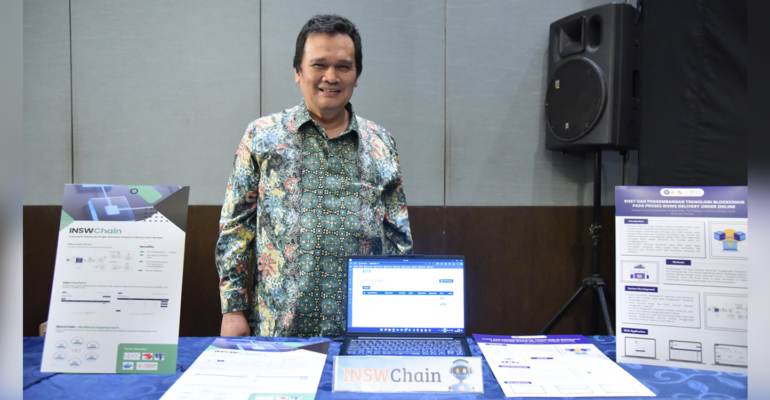BRAIN IPB University Researchers Develop INSW Delivery Order Online Application Products Based on Blockchain Technology

IPB University’s Blockchain Robotics Artificial Intelligence Network (BRAIN) researchers led by Prof Yandra Arkeman and the team successfully developed the Indonesia National Single Window (INSW) Delivery Order Online application product based on blockchain technology.
INSW is a system to simplify, facilitate, and accelerate the process of licensing documents for goods to be exported or imported through one service door.
INSW is present to reduce the length of the export or import licensing process. In addition, this system is also useful for reducing costs incurred, tightening and preventing the crime of smuggling illegal export and import goods that are detrimental to the state and harmful to human health and the environment.
According to Prof Yandra, the INSW Online application needs to be adjusted in line with the rapid development of technology, especially digital technology. This needs to be done so that the efficiency and effectiveness of services and the usefulness of the INSW Online application can be increased in accordance with the needs and demands of the market and world trade.
“One of the latest technologies that is currently and in the future will develop and become the demands of the international community is blockchain technology that can answer the needs of INSW Online,” said the Professor of the Faculty of Agricultural Technology, IPB University.
Prof Yandra and the BRAIN IPB University team have now successfully implemented blockchain technology in the INSW Online Delivery Order (DO) business process. The implementation of this technology is the result of an invitational Productive Innovative Research (Rispro) research activity funded by the Education Fund Management Agency (LPDP) of the Ministry of Finance (Kemenkeu) for 2023-2024.
The research partner is the National Single Window (LNSW) which contributes to providing business process information, technological facilities and infrastructure (servers and virtual machines), and is involved in the application validation and testing process.
“The blockchain application in the DO Online business process has been able to increase the speed of the DO transaction process, the submission of DO transactions in more detail, increase DO issuance, increase the security of DO file creation, make transactions more transparent, reliable and traceable, where the DO submission process can be monitored by the user, and non-repudiation,” said Prof Yandra during the Launching of IPB Innovations in the Field of Artificial Intelligence (AI) on 30/9 at the IPB International Convention Center (30/9), Bogor.
Furthermore, Prof Yandra revealed, practically the resulting business process improvements include:
- Cargo Owner (CO)/Freight Forwarder (FF) can send Request DO anytime (Single, Concurrent), from anywhere.
- Shipping Line (SL)/Shipping Agent (SA)/Services Provider Shipping Line (SPSL) issues DO Document in 1 (one) electronic data format that will be sent to INSW and will be forwarded to CO, Terminal Operator, INAPORT, and other interested parties.
- The Blockchain-based INSW system which by nature (characterised by a secured distributed ledger) has an auto broadcast feature to all actors which will speed up the DO issuance process.
- INSW Gateway becomes the hub in terms of:
- Receiving and forwarding DO Requests from CO to SL
- Receiving and forwarding DO Documents from SL to various parties (CO, Terminal Operator (TO), INAPORT).
- INSW provides a WebForm feature for SLs who wish to provide a DO Request decision.
5. The Smart Contract in the DO Online system is used to process transactions and validate DO data sent by CO/FF to SL/SA/SPSL to obtain DO issuance or rejection status in a distributed, transparent, traceable, and secure manner in the Blockchain network.
In addition, the IPB University lecturer from the Department of Agricultural Industrial Technology revealed that the output of this research exceeded what had been targeted. The research output reached a Technology Readiness Level (TKT) 8 exceeding the original target proposed, which was TKT 5. The application of the research results has been successfully tested by actors involved in the LNSW production environment with very satisfying results. (*/Rz) (IAAS/RUM)



